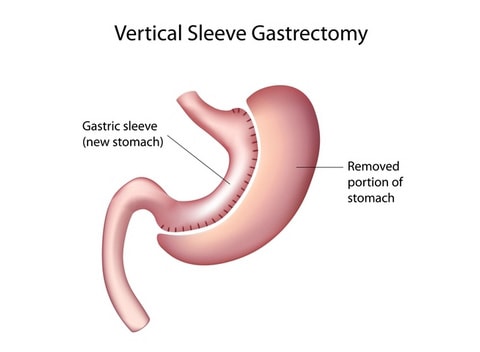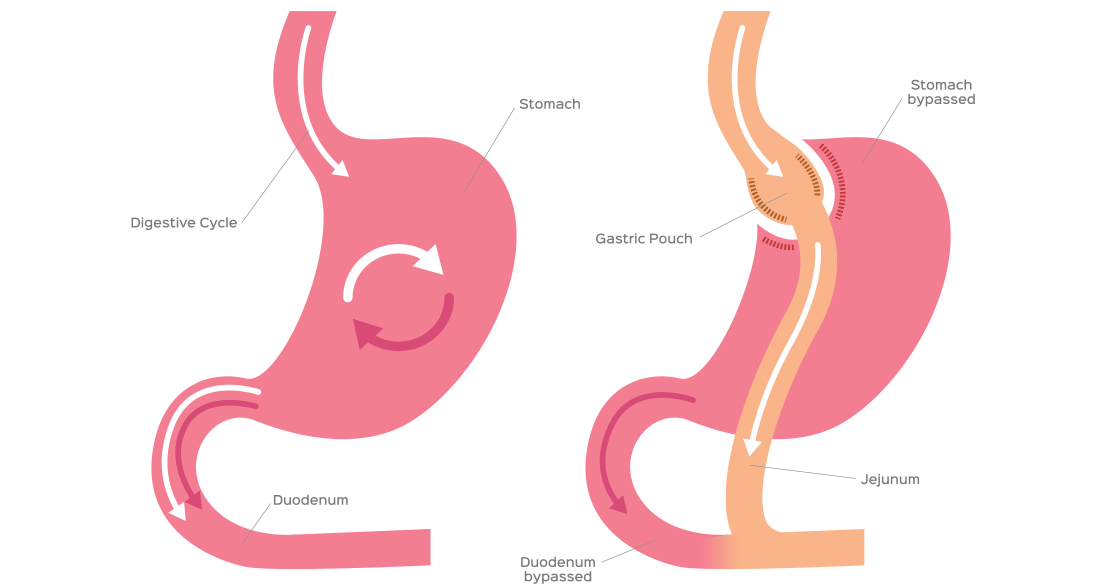Gastric Sleeve vs Gastric Bypass
You may be considering bariatric surgery if you’ve struggled to reach and maintain a healthy weight or if you suffer from obesity-related health problems. When combined with a comprehensive weight-loss program, bariatric surgery is extremely effective.
Since there is more than one option for Bariatric Surgery we’ll explain the difference between Gastric Sleeve and Gastric Bypass.
It can not only facilitate you in losing weight, but it can also assist in the improvement or complete elimination of obesity-related conditions such as high blood pressure, high cholesterol, and diabetes. Gastric bypass and gastric sleeve are two of the most successful types of bariatric surgery. While both procedures can result in significant weight loss within 1-2 years of surgery, there are some differences.
What’s the difference between these two surgeries?
Gastric sleeve surgery
The surgeon permanently removes about 80% of your stomach during gastric sleeve surgery. What’s left is packed into a stomach tube. There are no other changes.


Gastric bypass surgery
During this procedure, a small portion of the stomach is isolated, and the end of the small intestine is connected to the new stomach pouch, rerouting food around a large portion of the digestive system.


Is there a difference in recovery?
Gastric bypass surgery is more time-consuming to perform than gastric sleeve surgery. This is because gastric bypass requires more modifications to the digestive system than the sleeve. Both gastric sleeve and gastric bypass surgery are generally performed through laparoscopic surgery. To perform the surgery, lighted scope with a camera called a laparoscope and other tools are inserted through several small incisions in your abdomen. After gastric sleeve surgery, you should be able to return home in one or two days.
Who is a good candidate for this surgery?
| CRITERIA | GASTRIC BYPASS | GASTRIC SLEEVE |
| BMI 40+ | ✔️ | ✔️ |
| BMI 35-39.9 and additionally 2 or more related metabolic conditions | ✔️ | ✔️ |
| Metabolic syndrome | ✔️ | ✔️ |
*Gastric sleeve is recommended to patients with metabolic syndrome
Do I need to make dietary changes?
YES. Dietary changes before and after either surgery are required. Dietary changes after gastric sleeve surgery and gastric bypass surgery are essentially the same.
Timeline:
- You will need to be on a liquid diet for about 2 weeks after your surgery.
- You will need to eat pureed food and soft food for the next 2 weeks, then softer food.
- You’ll be able to eat normal food 30 to 40 days after surgery.
The size of your stomach pouch, which affects how much you can eat, is the most significant difference in your postoperative diet. The pouch created by either gastric sleeve or bypass surgery holds about 3 ounces.
Following are some important dietary guidelines to follow after your gastric sleeve or gastric bypass surgery:
- Eat small portions and stop when you’re satisfied.
- Thoroughly chew your food
- Eat slowly and take time to digest
- Take vitamins and supplements that are recommended by your doctor
- Drink enough water to stay hydrated
- Avoid difficult-to-digest foods like tough meat and bread
- Carbonated beverages should be avoided
Over time, your stomach pouch will stretch. After bariatric surgery, it’s critical not to overeat because your pouch can stretch to allow you to regain the weight you lost.
What are the pros and cons?
Pros and cons of gastric sleeve surgery
PROS
- Up to 65 percent of your excess body weight can be lost.
- Compared to gastric bypass, recovery time is shorter.
- Absorption of nutrients and vitamins is not impaired.
- Dumping syndrome is not as common
CONS
- In comparison to gastric bypass, less weight is lost.
- It can’t be reversed
Pros and cons of gastric bypass surgery
PROS
- Up to 80% of your excess body weight can be lost.
- Bypassing the small intestine, fewer calories are absorbed.
- It is possible to reverse the process, though it is difficult.
CONS
- Since it implies more anatomical changes, there’s a higher chance of complications.
- Intestinal bypass causes nutrient and vitamin malabsorption, which can lead to deficiencies.
- Dumping syndrome is more common.
- Risk of internal hernias, intestinal obstruction, or ulcers.
A gastric sleeve is a procedure that involves removing a portion of the stomach. A gastric bypass involves the creation of a small gastric pouch and the rerouting of the small bowel. Because the small bowel is rerouted, it is more invasive than the sleeve. Have an open and honest discussion with your surgeon about your fears and your goals. You should walk away confident that you chose the best procedure for you.
DISCLAIMER
If you have any medical questions or concerns, please talk to your healthcare provider.